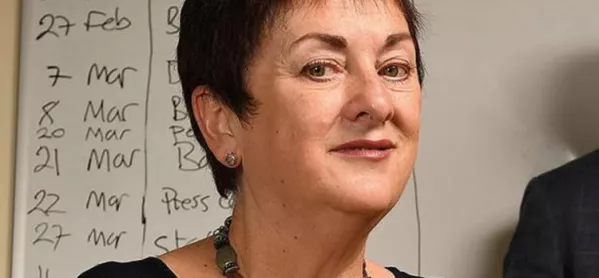- Home
- ‘This is the fourth industrial revolution - we need a new curriculum for tomorrow’s world’
‘This is the fourth industrial revolution - we need a new curriculum for tomorrow’s world’

In my last Tes blog, I argued that we need to engage in a serious, fundamental debate about the education system.
I wrote that if we are to prepare our children and young people for the world they will live and work in, then we must ditch the false divide between knowledge and skills. We must acknowledge that we need both.
And I noted that the Organisation for Economic Cooperation and Development is strongly advocating curricula that integrate knowledge, across subject disciplines, with skills development.
Andreas Schleicher, the head of education at the OECD, looks ahead to the abilities that will increasingly be needed by our school leavers in the future. He argues that the demands on learners and on education systems are evolving quickly.
Schleicher says that, in the past, education was primarily about teaching people something. But now, he says, education should be “about making sure that students develop a reliable compass and the navigations skills to find their own way through an increasingly uncertain, volatile and ambiguous world”.
Schleicher reminds us that, in the past, teachers could expect that what they taught would equip students with the skills needed for the rest of their lives. But that is not the case today because, he argues, “schools need to prepare students for more rapid economic and social change than ever before, for jobs that have not yet been created, to use technologies that have not yet been invented and to solve social problems that we do not yet know will arise”.
The robotics revolution
Schleicher is right. We are entering the age of the fourth industrial revolution. Robotics and automation are going to transform the way we work. We cannot simply carry on, carrying on.
We have a duty, as educators and as a society, to think deeply about what it is that children and young people need to know, and to be able to do, in a society that will change radically; for a future in which there will be few, if any, jobs for life.
And this thinking must involve a real consideration of skills. Because if we think that the sole purpose of education is to fill pupils up to the brim with knowledge, then we will let them down.
As an example, Schleicher considers what criteria will constitute literacy in the 21st century, and concludes that 21st-century literacy is about reading for learning, which includes the skills, capacity and motivation to: “identify, understand, interpret, create and communicate knowledge, using written material associated with varying situations in continuously changing contexts… synthesis of information as one finds one’s own way through hypertext on the internet, about dealing with ambiguity, developing healthy scepticism, an inquiring mindset, and interpreting and resolving conflicting pieces of information.”
Consider the complexity of the interaction between knowledge, skills and capability in Schleicher’s definition of 21st-century literacy. Don’t tell me that skills development is a soft option that will let our children down.
Skills developed through the synthesis of knowledge, across subject boundaries, should be a fundamental right for our nation’s children, built into our school curriculum.
I am happy to provide a starter for 10 in the skills list. The core skills that our education system needs to develop in students include:
- Communication skills - and, most importantly, verbal communication skills, which are underdeveloped as students spend so much of their time in school writing;
- Interpersonal skills - including the ability to work cooperatively with others, in teams, to take responsibility, to assume a leading role, to listen to others and to value their contribution;
- Excellent IT skills - including the ability to question “facts” on the internet and to challenge sources;
- The ability to see connections between subjects and to manipulate knowledge in new contexts;
- The ability to create, to make and to produce - applying theoretical concepts to practical outcomes.
These skills and abilities will not be developed unless they are thought about, planned for and assessed. They can be taught through subjects, but they will not be developed simply as a by-product.
Schleicher issues another challenge to our education system, which, as I highlighted last week, comes nearly at the top of the international league table for rote memorisation: “Perhaps the most challenging dilemma for educators in the 21st century is that routine, rule-based knowledge, which is easiest to teach and to test, is also easiest to digitise, automate and outsource.”
This should give policymakers and the profession huge pause for thought.
For too long a necessary debate about the aims, purpose and content of the school curriculum has been suppressed. We need to take up the intellectual cudgels and re-engage with this debate. For the sake of our nation’s children, and their futures.
Mary Bousted is joint general secretary of the NEU teaching union. She tweets @MaryBoustedNEU
Want to keep up with the latest education news and opinion? Follow Tes on Twitter and like Tes on Facebook
Register with Tes and you can read two free articles every month plus you'll have access to our range of award-winning newsletters.
Keep reading with our special offer!
You’ve reached your limit of free articles this month.
- Unlimited access to all Tes magazine content
- Save your favourite articles and gift them to your colleagues
- Exclusive subscriber-only stories
- Over 200,000 archived articles
- Unlimited access to all Tes magazine content
- Save your favourite articles and gift them to your colleagues
- Exclusive subscriber-only stories
- Over 200,000 archived articles



